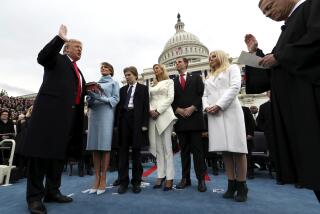Witnesses Won’t Set Prices for Publications
- Share via
Prompted by a recent U.S. Supreme Court decision upholding state sales taxes on religious items and books, Jehovah’s Witnesses have instructed their 817,000 U.S. members not to suggest any price for the books and magazines they offer door-to-door.
Jehovah’s Witnesses, known for their doomsday predictions and doorway persistence, will still seek donations but will no longer ask 25 cents each for copies of Awake! and Watchtower magazines or specific dollar amounts for their books.
The step by the Brooklyn-based Christian sect was taken to eliminate a possible premise for taxation, but it brings economic uncertainty into one of the largest religious publishing houses in the country.
The Watchtower Society, as it is formally known, published 35.8 million Bibles, books and brochures in 1989, double its 1988 output. The magazines publish an average of 11 million copies weekly for worldwide distribution. A breakdown of sales in the United States, where the new policy goes into effect, was not available.
“From a business standpoint it looks like fiscal suicide,” said Robert Johnson, a spokesman at the sect’s headquarters, “but we have never tried to operate like a business. We have always given a lot away.”
Several ex-members-turned-critics of the organization said Jehovah’s Witnesses are risking a major source of revenue but may come out ahead in the long run.
“I suspect they will get more money by not setting a price,” said Richard Rawe of Soap Lake, Wash. Though agreeing with Rawe, Tim Ervolina of Lakeland, Fla., added, “It’s a tremendous step. If it doesn’t work, they are in big trouble.”
However, an attorney at Witness headquarters said the sect’s “primary motivation is to make sure that the literature and contributions received are taken out of a commercial context.”
The change “has a relationship obviously” to the Supreme Court case that pitted the State of California vs. Jimmy Swaggart, said the attorney, James McCabe. The high court ruled unanimously Jan. 17 that California could apply its standard sales tax on income from Bibles, records and tapes sold in the state by the Louisiana evangelist.
Religious magazines are exempt from taxation in California and other states, but church-state experts have wondered whether books and other religious items might be seen increasingly as sources of tax revenue by some states in the wake of the Supreme Court decision.
McCabe called the ruling in the Swaggart case one of “the inroads on religious liberty in the last five to six years--an increasing trend to classifying religions as commercial.” This trend also shows up in some local ordinances, the attorney said.
Religious groups, ranging from the Hare Krishnas to the National Council of Churches, filed friend of the court briefs in the Swaggart case, contending that sales taxes are serious threats to religious liberty.
McCabe also filed a brief on behalf of the Witnesses, though he said it was not to support Swaggart’s arguments. Instead, he said, he reminded the Supreme Court of its rulings in the early 1940s favoring the Jehovah’s Witnesses whose activities had been restricted by municipal licensing fees and taxes.
But the Swaggart decision, written by Justice Sandra Day O’Connor, said a general sales tax on religious income is constitutional if it does not jeopardize the very existence of a religious body.
More to Read
Sign up for Essential California
The most important California stories and recommendations in your inbox every morning.
You may occasionally receive promotional content from the Los Angeles Times.













